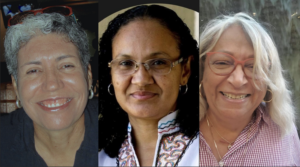Menu
Yolanda Rivera Castillo, Marisol Joseph-Haynes, and Vanessa Austin
University of Puerto Rico

Yolanda Rivera Castillo is a Full Professor at the University of Puerto Rico. She holds a Ph.D. from the University of California-Davis. She has published research on Puerto Rican Spanish, Creole Languages, Phonology, and Sign languages. In collaboration with linguists from different regions, she has conducted fieldwork on Creole languages, as well as on stigmatized varieties of major languages. Her publications include numerous papers, a book on Papiamentu, and poetry.
Marisol Joseph-Haynes, a native of Limón, Costa Rica, is fluent in Limonese Creole and Spanish, with English as her second language. She earned her MA in Linguistics from the University of Puerto Rico, Río Piedras Campus. Subsequently, she obtained her Ph.D. in Languages, Literature, and Culture of the Anglophone Caribbean from the same institution. Her scholarly interests encompass phonology, sociolinguistics, Creole genesis, endangered languages, language maintenance, and Caribbean cultural studies. Her current research investigates the syllabic structure and assimilation processes in Limonese Creole, as well as the attitudes of speakers towards this language.
Vanessa Austin, PhD is a retired linguist and TESOL instructor. She has served as Coordinator of English at Universidad Adventista de las Antillas in Puerto Rico and adjunct at UPR-Ponce, as well as facilitator at Sistema Universitario Ana G. Mendez in Wheaton, Maryland. Her research interests include noting Sa'amaka language change, and Typological and Decolonial Linguistics. She has taught in the United States, Puerto Rico and the Democratic Republic of Congo.
Talk Information:
Speaker-Centered Practices in the Analysis of three Vernaculars
March 7, 2025 | 9:00 AM
Estamos todos cansados de una historia
hecha desde arriba y desde afuera.
Fernando Picó
Languages originating in situations of colonization, slavery, and language contact (Creoles, mixed languages, stigmatized varieties, among others) have historically been defined with respect to the colonizing culture and language. As Makoni & Pablé (2022) state: “Indigenous languages in these colonial regions, […] were described from (lay) European perspectives rather that from (lay) local perspectives.” For example, the way in which minoritized languages are analyzed in many cases does not incorporate the speakers’ voices and assessment of their language, the role it plays in their identity and culture, and of language variation. Furthermore, we include incommensurability among issues upon considering native speakers’ internal knowledge of language structure (Spears, 2009, p.241).
We follow a speaker-centered linguistic practice and analysis for three vernaculars, based on the notion that “language is never independent from its users” (D’Arcy & Bender, 2023). Languages originate to ensure that individuals in a community communicate needs, wants, ideas, fears, and concerns within their group/family/tribe. We propose acknowledgement of the insider/outsider juxtaposition (Czaykowska-Higgins, 2009) in the framing of our fieldwork to lay bare the standings of all participants in research. We analyze four areas: (a) the vitality and social status of these vernaculars; (b) theories of language origin and genetic membership; (c) names for languages and language varieties; and (d) accuracy in the description of variation. Additionally, we discuss definitions of “native speaker” (Davies, 2013), ethical considerations in “extractive” views, authorship and language, and the issue of the grammatical incommensurability of languages (Spears, 2009).